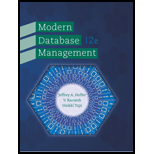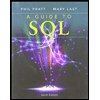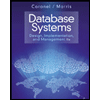
Modern Database Management (12th Edition)
12th Edition
ISBN: 9780133544619
Author: Jeffrey A. Hoffer, Ramesh Venkataraman, Heikki Topi
Publisher: PEARSON
expand_more
expand_more
format_list_bulleted
Concept explainers
Question
Chapter 6, Problem 6.5RQ
Program Plan Intro
The capabilities the new temporal features added to SQL 2011.
Expert Solution & Answer
Want to see the full answer?
Check out a sample textbook solution
Students have asked these similar questions
The Horse table has the following columns:
ID - integer, auto increment, primary key
RegisteredName - variable-length string
Breed - variable-length string
Height - decimal number
BirthDate - date
Delete the following rows:
Horse with ID 5
All horses with breed Holsteiner or Paint
All horses born before March 13, 2013
To confirm that the deletes are correct, add the SELECT * FROM HORSE; statement.
Why is Linux popular? What would make someone choose a Linux OS over others? What makes a server? How is a server different from a workstation? What considerations do you have to keep in mind when choosing between physical, hybrid, or virtual server and what are the reasons to choose a virtual installation over the other options?
Objective you will:
1. Implement a Binary Search Tree (BST) from scratch, including the Big Five (Rule of Five)
2. Implement the TreeSort algorithm using a in-order traversal to store sorted elements in a vector.
3. Compare the performance of TreeSort with C++'s std::sort on large datasets.
Part 1: Understanding TreeSort How TreeSort Works TreeSort is a comparison-based sorting algorithm that leverages a Binary Search Tree (BST):
1. Insert all elements into a BST (logically sorting them).
2. Traverse the BST in-order to extract elements in sorted order.
3. Store the sorted elements in a vector.
Time Complexity
Operation Average Case Worst Case (Unbalanced Tree)Insertion 0(1log n) 0 (n)Traversal (Pre-order) 0(n) 0 (n)Overall Complexity 0(n log n) 0(n^2) (degenerated tree)
Note: To improve performance, you could use a…
Chapter 6 Solutions
Modern Database Management (12th Edition)
Ch. 6 - Prob. 6.1RQCh. 6 - Prob. 6.2RQCh. 6 - Contrast the following terms: a. base table; view...Ch. 6 - Prob. 6.4RQCh. 6 - Prob. 6.5RQCh. 6 - Prob. 6.6RQCh. 6 - List six potential benefits of achieving an SQL...Ch. 6 - Prob. 6.8RQCh. 6 - Distinguish among data definition commands, data...Ch. 6 - Prob. 6.10RQ
Ch. 6 - Prob. 6.11RQCh. 6 - Prob. 6.12RQCh. 6 - Prob. 6.13RQCh. 6 - Drawing on material covered in prior chapters,...Ch. 6 - Explain and provide at least one example Of how to...Ch. 6 - Prob. 6.16RQCh. 6 - What is the difference between COUNT, COUNT...Ch. 6 - What is the evaluation order for the Boolean...Ch. 6 - If an SQL statement includes a GROUP BY clause,...Ch. 6 - Prob. 6.20RQCh. 6 - Prob. 6.21RQCh. 6 - Prob. 6.22RQCh. 6 - Explain why SQL is called a set-oriented language.Ch. 6 - When would the use of the LIKE key word with the...Ch. 6 - Prob. 6.25RQCh. 6 - Prob. 6.26RQCh. 6 - In what order are the clauses of an SQL statement...Ch. 6 - Within which clauses of an SQL statement can a...Ch. 6 - Prob. 6.29RQCh. 6 - Prob. 6.30RQCh. 6 - Prob. 6.31RQCh. 6 - Explain the difference between the WHERE and...Ch. 6 - Prob. 6.33RQCh. 6 - Prob. 6.34PAECh. 6 - Are based on the class scheduling 3NF relations...Ch. 6 - Prob. 6.36PAECh. 6 - Are based on the class scheduling 3NF relations...Ch. 6 - Are based on the class scheduling 3NF relations...Ch. 6 - Are based on the class scheduling 3NF relations...Ch. 6 - Prob. 6.40PAECh. 6 - Are based on the class scheduling 3NF relations...Ch. 6 - Prob. 6.42PAECh. 6 - Prob. 6.43PAECh. 6 - Are based on the class scheduling 3NF relations...Ch. 6 - Prob. 6.45PAECh. 6 - Prob. 6.46PAECh. 6 - Prob. 6.47PAECh. 6 - Prob. 6.48PAECh. 6 - Prob. 6.49PAECh. 6 - Prob. 6.50PAECh. 6 - Prob. 6.51PAECh. 6 - Prob. 6.52PAECh. 6 - Prob. 6.53PAECh. 6 - Modify the Product_T table by adding an attribute...Ch. 6 - Prob. 6.55PAECh. 6 - Add an order to the Order_T table and include a...Ch. 6 - Use the Pine Valley database to answer the...Ch. 6 - Prob. 6.58PAECh. 6 - Prob. 6.59PAECh. 6 - Prob. 6.60PAECh. 6 - Prob. 6.61PAECh. 6 - Prob. 6.62PAECh. 6 - Prob. 6.63PAECh. 6 - Prob. 6.64PAECh. 6 - Prob. 6.65PAECh. 6 - Prob. 6.66PAECh. 6 - Prob. 6.67PAECh. 6 - Prob. 6.68PAECh. 6 - Prob. 6.69PAECh. 6 - Prob. 6.70PAECh. 6 - Prob. 6.71PAECh. 6 - Prob. 6.72PAECh. 6 - Prob. 6.73PAECh. 6 - Prob. 6.74PAECh. 6 - Prob. 6.75PAECh. 6 - Prob. 6.76PAECh. 6 - Prob. 6.77PAECh. 6 - Prob. 6.78PAECh. 6 - Prob. 6.79PAECh. 6 - Prob. 6.80PAECh. 6 - Prob. 6.81PAECh. 6 - Prob. 6.82PAECh. 6 - Prob. 6.83PAECh. 6 - Prob. 6.84PAECh. 6 - Prob. 6.85PAE
Knowledge Booster
Learn more about
Need a deep-dive on the concept behind this application? Look no further. Learn more about this topic, computer-science and related others by exploring similar questions and additional content below.Similar questions
- I need help fixing the minor issue where the text isn't in the proper place, and to ensure that the frequency cutoff is at the right place. My code: % Define frequency range for the plot f = logspace(1, 5, 500); % Frequency range from 10 Hz to 100 kHz w = 2 * pi * f; % Angular frequency % Parameters for the filters - let's adjust these to get more reasonable cutoffs R = 1e3; % Resistance in ohms (1 kΩ) C = 1e-6; % Capacitance in farads (1 μF) % For bandpass, we need appropriate L value for desired cutoffs L = 0.1; % Inductance in henries - adjusted for better bandpass response % Calculate cutoff frequencies first to verify they're in desired range f_cutoff_RC = 1 / (2 * pi * R * C); f_resonance = 1 / (2 * pi * sqrt(L * C)); Q_factor = (1/R) * sqrt(L/C); f_lower_cutoff = f_resonance / (sqrt(1 + 1/(4*Q_factor^2)) + 1/(2*Q_factor)); f_upper_cutoff = f_resonance / (sqrt(1 + 1/(4*Q_factor^2)) - 1/(2*Q_factor)); % Transfer functions % Low-pass filter (RC) H_low = 1 ./ (1 + 1i * w *…arrow_forwardMy code is experincing minor issue where the text isn't in the proper place, and to ensure that the frequency cutoff is at the right place. My code: % Define frequency range for the plot f = logspace(1, 5, 500); % Frequency range from 10 Hz to 100 kHz w = 2 * pi * f; % Angular frequency % Parameters for the filters - let's adjust these to get more reasonable cutoffs R = 1e3; % Resistance in ohms (1 kΩ) C = 1e-6; % Capacitance in farads (1 μF) % For bandpass, we need appropriate L value for desired cutoffs L = 0.1; % Inductance in henries - adjusted for better bandpass response % Calculate cutoff frequencies first to verify they're in desired range f_cutoff_RC = 1 / (2 * pi * R * C); f_resonance = 1 / (2 * pi * sqrt(L * C)); Q_factor = (1/R) * sqrt(L/C); f_lower_cutoff = f_resonance / (sqrt(1 + 1/(4*Q_factor^2)) + 1/(2*Q_factor)); f_upper_cutoff = f_resonance / (sqrt(1 + 1/(4*Q_factor^2)) - 1/(2*Q_factor)); % Transfer functions % Low-pass filter (RC) H_low = 1 ./ (1 + 1i * w *…arrow_forwardI would like to know the main features about the following three concepts: 1. Default forwarded 2. WINS Server 3. IP Security (IPSec).arrow_forward
- map the following ER diagram into a relational database schema diagram. you should take into account all the constraints in the ER diagram. Underline the primary key of each relation, and show each foreign key as a directed arrow from the referencing attributes (s) to the referenced relation. NOTE: Need relational database schema diagramarrow_forwardWhat is business intelligence? Share the Business intelligence (BI) tools you have used and explain what types of decisions you made.arrow_forwardI need help fixing the minor issue where the text isn't in the proper place, and to ensure that the frequency cutoff is at the right place. My code: % Define frequency range for the plot f = logspace(1, 5, 500); % Frequency range from 10 Hz to 100 kHz w = 2 * pi * f; % Angular frequency % Parameters for the filters - let's adjust these to get more reasonable cutoffs R = 1e3; % Resistance in ohms (1 kΩ) C = 1e-6; % Capacitance in farads (1 μF) % For bandpass, we need appropriate L value for desired cutoffs L = 0.1; % Inductance in henries - adjusted for better bandpass response % Calculate cutoff frequencies first to verify they're in desired range f_cutoff_RC = 1 / (2 * pi * R * C); f_resonance = 1 / (2 * pi * sqrt(L * C)); Q_factor = (1/R) * sqrt(L/C); f_lower_cutoff = f_resonance / (sqrt(1 + 1/(4*Q_factor^2)) + 1/(2*Q_factor)); f_upper_cutoff = f_resonance / (sqrt(1 + 1/(4*Q_factor^2)) - 1/(2*Q_factor)); % Transfer functions % Low-pass filter (RC) H_low = 1 ./ (1 + 1i * w *…arrow_forward
- Task 3. i) Compare your results from Tasks 1 and 2. j) Repeat Tasks 1 and 2 for 500 and 5,000 elements. k) Summarize run-time results in the following table: Time/size n String StringBuilder 50 500 5,000arrow_forwardCan you please solve this without AIarrow_forward1. Create a Vehicle.java file. Implement the public Vehicle and Car classes in Vehicle.java, including all the variables and methods in the UMLS. Vehicle - make: String model: String -year: int + Vehicle(String make, String, model, int, year) + getMake(): String + setMake(String make): void + getModel(): String + setModel(String model): void + getYear(): int + set Year(int year): void +toString(): String Car - numDoors: int + numberOfCar: int + Car(String make, String, model, int, year, int numDoors) + getNumDoors(): int + setNumDoors (int num Doors): void + toString(): String 2. Create a CarTest.java file. Implement a public CarTest class with a main method. In the main method, create one Car object and print the object using System.out.println(). Then, print the numberOfCar. Your printing result must follow the example output: make Toyota, model=Camry, year=2022 numDoors=4 1 Hint: You need to modify the toString methods in the Car class and Vehicle class!arrow_forward
- CHATGPT GAVE ME WRONG ANSWER PLEASE HELParrow_forwardHELP CHAT GPT GAVE ME WRONG ANSWER Consider the following implementation of a container that will be used in a concurrent environment. The container is supposed to be used like an indexed array, but provide thread-safe access to elements. struct concurrent_container { // Assume it’s called for any new instance soon before it’s ever used void concurrent_container() { init_mutex(&lock); } ~concurrent_container() { destroy_mutex(&lock); } // Returns element by its index. int get(int index) { lock.acquire(); if (index < 0 || index >= size) { return -1; } int result = data[index]; lock.release(); return result; } // Sets element by its index. void set(int index, int value) { lock.acquire(); if (index < 0 || index >= size) { resize(size); } data[index] = value; lock.release(); } // Extend maximum capacity of the…arrow_forwardWrite a C program using embedded assembler in which you use your own function to multiply by two without using the product. Tip: Just remember that multiplying by two in binary means shifting the number one place to the left. You can use the sample program from the previous exercise as a basis, which increments a variable. Just replace the INC instruction with SHL.arrow_forward
arrow_back_ios
SEE MORE QUESTIONS
arrow_forward_ios
Recommended textbooks for you
 A Guide to SQLComputer ScienceISBN:9781111527273Author:Philip J. PrattPublisher:Course Technology Ptr
A Guide to SQLComputer ScienceISBN:9781111527273Author:Philip J. PrattPublisher:Course Technology Ptr Database Systems: Design, Implementation, & Manag...Computer ScienceISBN:9781305627482Author:Carlos Coronel, Steven MorrisPublisher:Cengage Learning
Database Systems: Design, Implementation, & Manag...Computer ScienceISBN:9781305627482Author:Carlos Coronel, Steven MorrisPublisher:Cengage Learning Database Systems: Design, Implementation, & Manag...Computer ScienceISBN:9781285196145Author:Steven, Steven Morris, Carlos Coronel, Carlos, Coronel, Carlos; Morris, Carlos Coronel and Steven Morris, Carlos Coronel; Steven Morris, Steven Morris; Carlos CoronelPublisher:Cengage Learning
Database Systems: Design, Implementation, & Manag...Computer ScienceISBN:9781285196145Author:Steven, Steven Morris, Carlos Coronel, Carlos, Coronel, Carlos; Morris, Carlos Coronel and Steven Morris, Carlos Coronel; Steven Morris, Steven Morris; Carlos CoronelPublisher:Cengage Learning

A Guide to SQL
Computer Science
ISBN:9781111527273
Author:Philip J. Pratt
Publisher:Course Technology Ptr

Database Systems: Design, Implementation, & Manag...
Computer Science
ISBN:9781305627482
Author:Carlos Coronel, Steven Morris
Publisher:Cengage Learning

Database Systems: Design, Implementation, & Manag...
Computer Science
ISBN:9781285196145
Author:Steven, Steven Morris, Carlos Coronel, Carlos, Coronel, Carlos; Morris, Carlos Coronel and Steven Morris, Carlos Coronel; Steven Morris, Steven Morris; Carlos Coronel
Publisher:Cengage Learning

